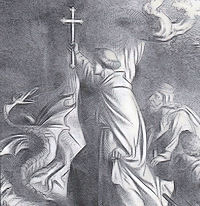Ordinary Time: September 2nd
Tuesday of the Twenty Second Week of Ordinary Time
Other Commemorations: St. Agricola, Bishop (RM)
» Enjoy our Liturgical Seasons series of e-books!
Jesus said to his disciples:“The Kingdom of heaven is like a treasure buried in a field, which a person finds and hides again, and out of joy goes and sells all that he has and buys that field. Again, the Kingdom of heaven is like a merchant searching for fine pearls. When he finds a pearl of great price, he goes and sells all that he has and buys it (Mt 13:44-46).”
According to the 1962 Missal of Bl. John XXIII the Extraordinary Form of the Roman Rite, today is the feast of St. Stephen of Hungary. His feast in the Ordinary Form of the Roman Rite is celebrated on August 16.
St. Agricola
The son of a Gallo-Roman senator named Magnus, St. Agricola entered the monastery about the age of 14, possibly after the death of his mother, and acquired a great reputation for piety and learning. Meanwhile, his widowed father, Magnus, received Holy Orders and became a monk. Magnus was named bishop of Avignon 16 years later, and he consecrated his son, who by then had been a priest for quite some time, to become coadjutor bishop. St. Agricola succeeded his father ten years later and became famous for preaching and aid to the sick and poor. Depicted here with a dragon, St. Agricola, like Sts. George, Arsacius and Margaret of Antioch, is considered to have done battle with the devil–not utilizing his own weak human will, but shielded with a crucifix, much prayer, fasting and faith in his Redeemer. As bishop of Avignon, St. Agricola worked all the harder for the sake of his flock. St. Agricola lived from 625-700. He was named Patron of Avignon in 1647.
—Excerpted from 2009 Saints Calendar, Tan Books and Publishers
Patronage: Avignon; against misfortune; against plague epidemics; for rain; for good weather; storks; for good harvests; against gambling; against misfortune of all kinds
Symbols and Representation: storks
Highlights and Things To Do:
- For more information on this saints, see
- St. Agricola is one of the saints: Which Saint to pray for fighting against a Covid infection? A short survey
- The Church of St. Agricola (Eglise Saint-Agricol), built in the 1300s in Avignon, is one of the oldest Catholic churches still standing in Avignon, France. See these sites for more details:
- St. Agricola predates the Avignon Papacy, one of the black marks on the Church's history. However, that doesn't keep us from toasting to this saint's honor with some delicious Châteauneuf-du-Pape wine. Read a longer history here.
- Agricola is the Latin word for farmer. It is unclear if St. Agricola's patronage for good harvests and weather is derived from his name or from his life. Either way, this is another saint to invoke for help and success in gardening, homesteading, and farming. And of course, the next time your land is invaded by a flock of storks, definitely call on St. Agricola.






